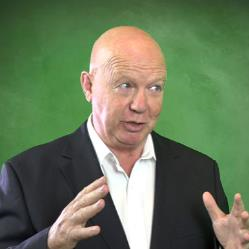 "How and when will AI disrupt the way we sell?" - discussion with John Smibert.
"How and when will AI disrupt the way we sell?" - discussion with John Smibert.
Artificial intelligence (AI) - and robotics - has been around for a long time but it has not yet disrupted white collar work very much yet - or has it?. And surely our sales profession is safe - no robot could ever sell - or could it?
As it turns out AI development has accelerated in recent year and it is now contributing considerably to the sales world and influencing significant change.
 I asked Tony Hughes to explain how and for his futuristic view of what AI and robotics will mean to us in the sales world - and how soon can we expect it to impact us?
I asked Tony Hughes to explain how and for his futuristic view of what AI and robotics will mean to us in the sales world - and how soon can we expect it to impact us?
Tony's answer was brutal. He said that the impact of AI on sales was already significant - so much so that within only 4 years (2020) 85% of business to business (B2B) sales transactions will occur without human intervention resulting in the redundancy of about 25% of current B2B sales roles in that time.
But there is good news - for the remaining salespeople AI may in fact help us do our job better.
See Ton'y's full interview below for some enlightening advice and guidance to help us embrace the changes coming fast.
Tony is a leading author and keynote speaker in the world of B2B sales and sales leadership. He is well known for his strategic selling book "The Joshua Principle" and for the RSVPselling methodology.
See more of the 'TALKING SALES' series here
Interview
John: Hello! I've got Tony Hughes with me again - welcome back, Tony!
Tony: Hi John!
John: Hey Tony, I've seen you writing recently about Artificial Intelligence in sales - and I know we had an earlier discussion about technology and so on - is AI something that's developing very quickly? I've even heard people talk about artificial intelligence taking over the sales role in some cases.
Tony: Yes.
John: What's your thoughts about what AI is going to mean in the sales world, for us and for sales managers?
Tony: Well, artificial intelligence or AI means a lot of different things to different people. When we use a simple thing like Google Search or Siri on our iPhone, we're in essence using an AI algorithm to go and find things for us. I believe that professional selling is in a process of being disrupted quite dramatically. Andy Hoar from Forrester wrote in mid-2015 that 22% of sales roles are going to disappear within four years, and Gartner believe that by 2020 85% of B2B transactions will occur without any human intervention. Now, that's not the process of acquiring a brand new customer, that's just transacting if you're an existing client.
John: And there's a real distinction between the two, isn't there?
 Tony: Yes, there is. But I nevertheless think that about a third of sales roles are going to disappear, and the reason they'll disappear is because through commoditisation and through self-service, when people just want to buy online, and products become commodities in the eyes of buyers, through those two forces there's just not going to be enough margin to fund the role of especially a field salesperson. So, salespeople need to work out "How do I create enough value to really fund my role?"
Tony: Yes, there is. But I nevertheless think that about a third of sales roles are going to disappear, and the reason they'll disappear is because through commoditisation and through self-service, when people just want to buy online, and products become commodities in the eyes of buyers, through those two forces there's just not going to be enough margin to fund the role of especially a field salesperson. So, salespeople need to work out "How do I create enough value to really fund my role?"
The thing that's interesting is if you look at IBM's Watson, which beat the Jeopardy champion some years ago, Watson's been progressing and it's really cracked that nut of natural language, and it's being applied now to medicine. But interestingly, there's an Australian company called Complexica, and I actually met with their managing director (Matthew Michalewicz) recently and had a really interesting conversation. They've created an AI entity, it's a digital assistant called Larry, and Larry is designed for salespeople.
John: Wow.
Tony: We all know through the concept of things like Challenger Selling that we need to lead with insight, we need to take some value to our clients other than just information, and Larry, as a digital assistant, is doing that for salespeople, and it's really interesting.
John: So Larry's actually finding the insight itself?
Tony: Yes.
John: So, if the real value of a salesperson is bringing insight to the table, and artificial intelligence can do it, maybe it is undermining the value of a salesperson.
Tony: Well, not really, because if the salesperson is great with relationships... Relationships are a value; the problem today is that relationships alone are not enough. We need to have great relationships, and bring insight, and bring value for people, and help them manage their risk. People don't want a relationship with an AI entity or a computer or an algorithm, they want a relationship with a person, but the person can work with technology to start to bring those insights.
 As an example with Complexica's Larry product, what it enables a seller to do for example - if it was in the wine industry where you were calling on alcohol outlets - is Larry can do a whole lot of analysis for you to find out - based on seasons, based on weather - what sort of products - based on socio-economic demographics - what's going on, so that the rep can turn up with some valuable information for the person they're calling on. It can look at route optimisation, it can actually have a look at where is the salesperson going to get the best yield for their time so they weren't wasting time. So, a great salesperson that can build relationships with a technology like artificial intelligence can go and get great results.
As an example with Complexica's Larry product, what it enables a seller to do for example - if it was in the wine industry where you were calling on alcohol outlets - is Larry can do a whole lot of analysis for you to find out - based on seasons, based on weather - what sort of products - based on socio-economic demographics - what's going on, so that the rep can turn up with some valuable information for the person they're calling on. It can look at route optimisation, it can actually have a look at where is the salesperson going to get the best yield for their time so they weren't wasting time. So, a great salesperson that can build relationships with a technology like artificial intelligence can go and get great results.
John: And I assume that'll be most valuable where the solution or the sale is very complex, where an organisation is looking at how they can change the organisation, and therefore they need salespeople that can help in a very complex environment.
Tony: Yes.
John: And that's where the commoditisation is not impacting.
Tony: Actually it's interesting you say that, because where Larry adds the most  value for Complexica's customers is where they're dealing with massive amounts of data, you're right. Because when there's lots of data and massive numbers of transactions, mining that and finding the insights and information within it that can help people is not easy. You need armies of people to figure that out.
value for Complexica's customers is where they're dealing with massive amounts of data, you're right. Because when there's lots of data and massive numbers of transactions, mining that and finding the insights and information within it that can help people is not easy. You need armies of people to figure that out.
John: Okay, so let me try and summarise. What you're saying is yes, we will have a big percentage of the current sales force around the world disappear.
Tony: Yes, that's true.
John: If people are selling a commodity and there's no way in which they can add significant value that will be valued by the client, they won't have a job in the future.
Tony: That's right.
John: However, on the other side, the salespeople that are adding a lot of value and instilling in a complex environment, they will get artificial intelligence to help them be even more valuable for their customers, and therefore they will survive and grow in the role.
Tony: Yes. And if they embrace other technologies, those concepts of social selling, platforms like LinkedIn and all of those other tools they can use, they can be more efficient as well.
John: Okay. So, there's a very, very serious message here. Hey guys, if you want to grow in the sales environment, you need to be, one, selling to organisations that value what you can deliver, and you need to be able to bring value to the table through insight and so on, and leverage technology to do that. If you don't know how to do that, it's probably best to either learn or get out of the business."
Tony: It's true. A third of salespeople are going to lose their jobs. Relationships alone are not enough; you've got to embrace technology, including artificial intelligence, to take those insights to your customers that help fund your role.
John: Fantastic, Tony - it's given me good insight into the whole subject.
Tony: Thanks, John!
John: Thank you!
****************
More interviews with Tony Hughes:
***************

Your Invitation: I invite you to join the Sales Leader Forum group on LinkedIn where you can experience informative discussions with your peers and sales thought leaders on subjects like the one we have discussed here. I also invite you to subscribe to the
- Sales Leader Resource Centre here
- Sales Leader YouTube channel here (300+ sales leadership videos)
Please Share: If you valued this article, please share via your Twitter, LinkedIn, Google+ and Facebook social media platforms. I encourage you to join the conversation or ask questions. So feel free to add a comment on this post - I promise to respond. If inclined please follow my LinkedIn post page here.
Want to touch base? If you have questions please feel free to contact me - email: john.smibert(at)salesleaderforums.com, Phone: +61 404857893 or Skype: john.smibert